A Big Question for Multi-Warehouse WMS Implementations
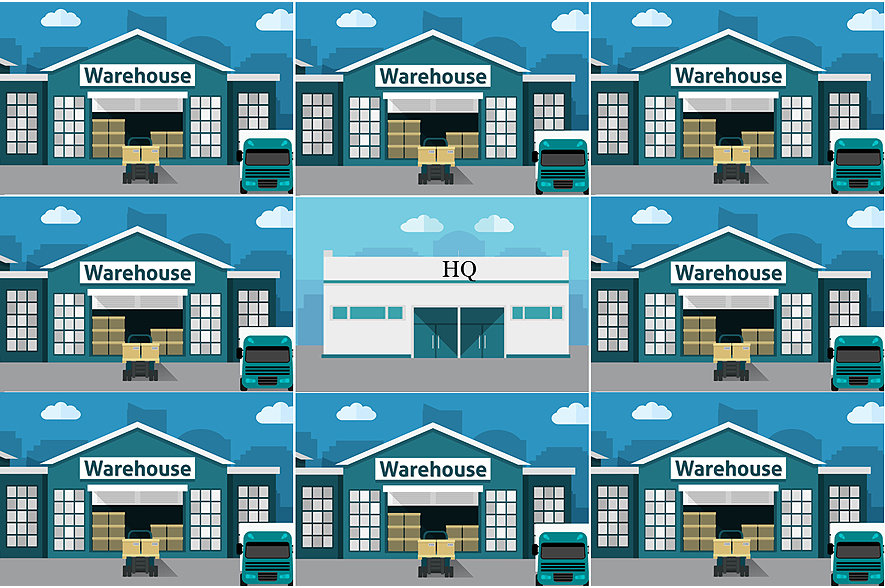
The strategic planning stage is obviously critical for WMS implementations, and one commonly glossed over aspect is multi-warehouse configurations. The implementation team is focused on the success of the first site with both budget and timeline crunches in mind, and they lose sight of the overall big picture. That first, single site is simply one part of a multi-year global WMS rollout strategy. It’s much harder to change the tires mid-race on this one, so let’s get it right the first time. There are a nearly infinite number of variations on the below setups, but whether on-premise or cloud hosted let’s break down the two main options:
Implement Warehouses Within the Same Instance:
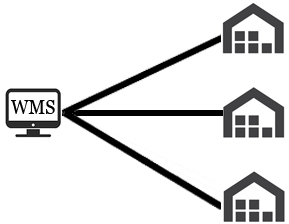
Good
- Simplifies IT maintenance (hotfixes, patches, etc…)
- Streamlined “big picture” visibility across all warehouses
Bad
- All sites share risk of introducing new functionality that might just benefit one site
- Not ideal for coordinating maintenance downtimes across different time zones
Bottom Line
This option can make sense for a smaller operation with limited IT resources that has fewer customers and sites that are all in roughly the same geographic area.
Each Warehouse in Own Independent Instance and Server:
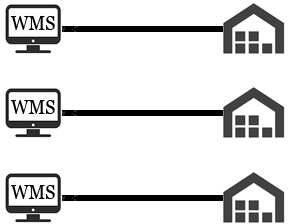
Good
- Better for a 3pl servicing multiple clients with varying requirements
- Drastically less risk in the event of a major defect
Bad
- More work on the IT side
- Less big-picture visibility
Bottom Line
Due to the extreme riskiness of the “all-in-one” method, most medium-large warehouses are forced to adopt this strategy.
After Answering That Question…Do You Cloud?
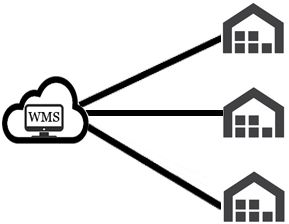
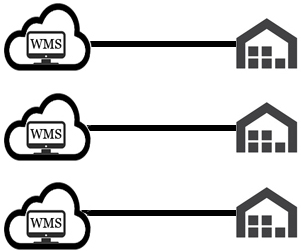
Good
- Easier to receive product updates
- Easier to scale up resources with company growth
- Generally, less likely to experience IT-related outages
Bad
- Provider MUST have fast-responding quality support
- Provider MUST have secure data
Bottom Line
The answer is “probably.” In recent years we are seeing more customers move to the cloud. If you must be up-to-date on the latest features and tech, go with the cloud option. Should you have a basic setup and want to keep things in-house, then consider going on-premise.
There are many ways to skin a cat for multi-warehouse implementations, so consider the above as the main umbrella options and not cast in-stone. You especially have to have all internal and external stakeholders aligned before diving in and setting a direction for a multi-warehouse implementation versus a single operation install.
How do you handle multi-warehouse implementations? Feel free to drop us a line if you have any questions, or feedback on this post! We are an official reseller of Blue Yonder WMS, and provide the full gamut of related WMS professional services.
This post was written by:

Recommended Content
SLA Optimization Worksheet
Enhance your service level agreements (SLAs) with this SLA Optimization Worksheet. Use it to assess your current systems, identify gaps, and create a roadmap for improvement. Includes actionable steps, KPIs, and next steps to boost efficiency and customer satisfaction.
Optimizing Layer Picking Efficiency for Large Global Company
A large global company optimized its automated layer picker, reducing manual layer picking by 70% through seamless integration with Blue Yonder WMS and Robotics Hub. Tryon Solutions developed API endpoints, real-time reporting, and a pick face manager to enhance...
Digital Transformation: The Key to Meeting Customer Expectations
In today’s fast-paced retail environment, customers expect seamless experiences whether shopping online or in-store. Shipped-to-home orders, in-store pickups, and last-minute changes are now the norm. However, many businesses struggle to meet these demands due to...
Tryon Solutions for Test Management
At Tryon Solutions, we design tailored Test Management strategies that help you proactively identify failures and streamline testing processes. Our expertise ensures your systems are reliable, safeguarding your operations from costly downtime. Download the brochure...
When to Hire a WMS Consultant
Your Warehouse Management System (WMS) is at the core of your supply chain operations. As the demands on your warehouse evolve, ensuring your WMS is future-proof is critical to maintaining efficiency, meeting customer expectations, and staying competitive. But when is...
